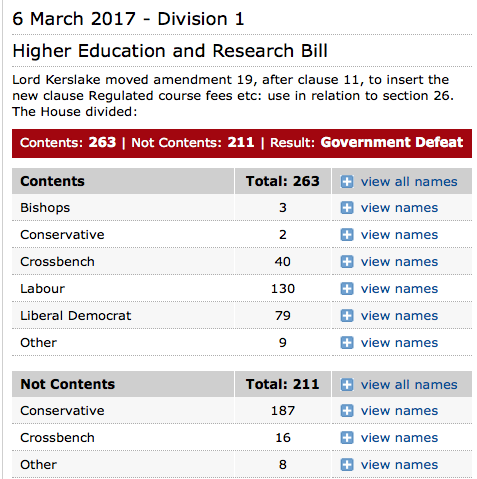The Higher Education and Research Bill continues its rough ride through the House of Lords this week, at the Report Stage. This Monday gone was Day One, in which members discussed ‘HE providers, course fees, electoral roll registration for students and restriction of enrolments’.
One of the most publicised votes on Monday was the proposed change to stop HE providers using the OfS ratings to determine course fees, as was favoured by 263 to 211. 
The amendment was moved by Lord Kerslake – but also in the name of ‘noble Lord, Lord Stevenson, and the noble Baroness, Lady Garden’, in which he clarified ‘:
The effect of this amendment would be to prohibit the use of the TEF ranking in either the setting of the student fee cap or the number of students that a university can recruit. This would apply to both national and international students, so preventing the possibility that the TEF ranking might be linked to the issuing of student visas.
The Lord then continues as to his reasoning:
First, the TEF is not ready. There is not yet a settled methodology. Indeed, the very fact that the Government have agreed to a fundamental review this summer, including how the metrics are flagged, the balance between the metrics and the provider submissions, and the number and names of the ratings, tells us that we are some way off where we need to be on this. As the noble Lord, Lord Norton, put it so well in Committee, the TEF is being asked to bear too heavy a load. As things currently stand, universities ranked gold and silver will be able to increase their fees, but bronze-ranked universities, perhaps 20% of the total, will not. Yet in our debate on the TEF the Minister stated clearly that bronze should be seen as a worthy rating. Whichever way we look at the issue, this is an approach to fee setting that has not been properly thought through.
My second reason for not making the link is that the TEF rating will relate to the university, not the subject or course. We will not see subject-level ratings until 2020 and yet we know that it is perfectly possible to have a mediocre course in an otherwise excellent university, and indeed vice versa. It can be argued that the TEF ranking gives an indication of the overall student experience at a particular institution, but the variation which so obviously exists within institutions makes that argument quite unconvincing.
My third reason why this is a bad move is that, if the case for the link is being made on behalf of students, we know that the body which represents them, the NUS, is vehemently against the proposal. Its argument is a simple one: there is no evidence of a relationship between increasing fees and increasing quality of teaching. It seems very hard to argue the case for a shift towards a student voice as a consequence of student loans and then to completely ignore the clear view of student representatives up and down the country.
My fourth and final argument is that there is absolutely no need to provide this particular incentive to improve teaching quality. The impact of the TEF, coupled with the demographic and other changes we are experiencing, will provide more than enough incentive. University-age pupils leaving school have fallen for four years and are set to fall for another six. The total reduction will be 20%. At the same time, maintaining and growing the number of overseas students is likely to be a real challenge. Put simply, we do not need to put further pressure on what is already going to be a challenged system.
To conclude, there is a strong case for promoting teaching excellence and for allowing student fees to rise in order to reflect increasing costs. However, putting the two together in the way the Government are currently proposing is both ill-judged and unfair. I beg to move.
The Bill continued in the House of Lords yesterday, discussing international students, the Office for Students and assessment schemes. The concern amongst the peers is that the TEF rankings will have negative consequences internationally. Lord Judd stated:
My Lords, I agree with those who have expressed deep anxiety about the impact of this gold, silver and bronze scheme. When I first read about it, I thought it was a further trivialisation of the whole concept of education and scholarship. It seemed to me to be the language and preoccupations of the market—marketing creeping in and distorting still further that ideal. I have said before that I wish that we could get back to the concept of universities as a community of scholars—I would hope, an international one. Students are not clients or customers: they belong to the university and they should be contributors to it. Student surveys encourage the concept of “the university and us”; whereas they should be encouraged to contribute to thinking about how the university is functioning and how it could improve its provision.
I also agree with those who have expressed another anxiety. If we are really concerned about the quality of higher education, how on earth will it help to start having oversimplified measures of this kind?
However the main discussion on Wednesday was on the introduction of new providers. Government faced defeat as the Lords ‘warned of risks from for-profit providers gaining degree awarding powers and university status‘.